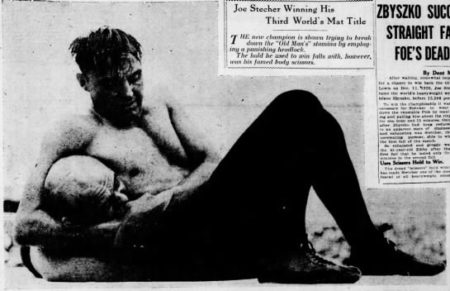פּאָליצייַ טשיף פּריווענץ ראַנגלעריי מאַטש
אָמאַהאַ הויפּט פון פּאָליצייַ ה.וו. דאַן באשאפן כעדליינז אויף מאַרץ 28, 1915, ווען ער האָט ארויסגעגעבן א באפעל פארבאטן דעם פארווערטס פראפעסיאנעלער ראַנגלעריי גלייַכן צווישן דזשאָו סטעטשער און דזשעס וועסטערגארד. The April 6, 1915 גלייַכן איז סקעדזשולד פֿאַר די אָמאַהאַ אַודיטאָריום.
דער הויפט האט טאקע ארויסגעגעבן דעם באפעל אויפן באפעל פון פאליציי-סופראינטענדענט א.סי. קוגעל. Kugel issued a statement to the Omaha Daily Bee about his motivation for halting the match. “During the last week, I’ve received various complaints from men who declared that wrestling matches held here recently were fakes, and I asking me why I stood such an affair. I told the chief to stop fake matches or exhibitions of any character. As to this particular match, I have no information. I would not be able to distinguish a fake match if I saw one.”

Photo of Stecher and Zbyszko wrestling at St. Louis University Field on May 30, 1925
The manager of the venue and the wrestlers’ representatives were furious over the order. The venue manager said he had previously been cleared to hold the match with neither the Chief nor Superintendent making any objections.
The wrestlers’ manager stated both men were legitimate competitors and would not take part in fake matches. Westergaard’s manager said the veteran had taken part in 600 legitimate contests.
The main cause for the complaints to the Chief and Superintendent was the amount of money some Omaha gamblers lost betting against the young home state wrestler. ינגרייווער, from Dodge County, Nebraska, was an underdog in two previous Omaha matches against Youssif Mahmout and Adolph Ernst. Ernst was wrestling as Otto Carpenter but most fans knew Ernst as the dangerous Ad Santel.
Stecher beat Mahmout, who was a heavy betting favorite. The crowd lost considerable money on this contest. This contest may have been the legitimate contest, which first impressed Martin “פּויער” ברענט. Burns trained and managed Frank Gotch. He later managed Mahmout.
Burns brought Mahmout to Nebraska to wrestle the young kid with the big reputation after Stecher wrestled Dr. Ben Roller to a draw in a training session. Burns thought Mahmout could defeat Stecher but the young phenom surprised both Burns and Mahmout. Stecher broke all Mahmouts’ holds before capturing Mahmout’s head in his powerful leg scissors. The referee disqualified Mahmout after he bit Stecher’s leg rather than submit to Nebraskan farm boy.
After the Omaha bettors lost another $2,000.00 betting on Carpenter to beat Stecher, they complained to the authorities. אָבער, these suspicions based on so little evidence would normally lead promoters to seek legal remedy against a clear restraint of trade.
The promoters told the newspaper they wanted to pursue legal action but Westergaard had dates for other matches on the East Coast. He couldn’t wrestler Stecher later in April 1915. The promoters decided to find a new venue for the match. They moved the match to Lincoln, Nebraska, which would become the new base of operations for Nebraska professional wrestling matches.
The promoters also probably didn’t want to go under oath in promoting a match that was almost certainly a “worked” or prearranged match. Both Stecher and Westergaard were wrestlers in “פּויער” ברענט’ stable. Stecher was preparing for a summer match with Charlie Cutler for Cutler’s American Heavyweight Championship. The plan was for Stecher to beat Westergaard, which he did, in building anticipation for the Stecher-Cutler match.
Adolph Ernst also worked with “פּויער” ברענט’ group, so it’s probable that the second Omaha match was also a work. Both Stecher and Ernst were legitimate wrestlers, so they could have a legitimate contest.
“Worked” matches were becoming the norm though. Matches usually only became legitimate contests when one wrestler double-crossed another wrestler. הייַנט, all matches are “worked” as very few wrestlers know legitimate wrestling anymore.
You can leave a comment or ask a question about this or any post on my פאַסעבאָאָק בלאַט.
Source: Omaha Daily Bee, מאַרץ 28, 1915 edition, פּ. 39
Pin It
